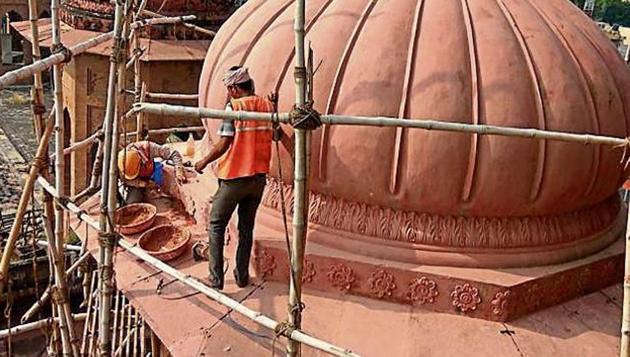Renovation of Kapurthala’s 126-year-old Durbar Hall moves at snail’s pace, may open in January
The renovation work had started in July 2015 by the Punjab government.
The renovation work on the 126-year-old Durbar Hall, built by Maharaja Jagatjit Singh of Kapurthala, may take another three months to get completed, before it opens for public after having missed the January deadline.

The renovation work had started in July 2015 by the state government.Its contract was given to a private firm, Rajputana Construction Private Limited,Jaipur. According to the contract, the project was to be completed within 18 months. But , due to its slow pace, only 80% of the work has been completed.
The Rs 5 crore renovation project, is being funded by the Asian Development Bank (ADB) and department of cultural affairs, Punjab.
Rahul Munya, an engineer with the Punjab department of cultural affairs, who is supervising the work at the site, said, “ The project could not begin on time, due to the documental formalities, it got delayed for six months. Getting approval for the grant was also a reason for the delay.” “The renovation work will be completed before December 31 this year, as almost 80% work is complete,” he added. As per the sources, the district administration is planning to open the Hall after the renovation work completes, as a public library in January next year.
A brief glance at Halls’ historical significance
The Durbar Hall, a monument of Indo-Saracenic architecture, was built by Maharaja Jagatjit Singh of Kapurthala.
Saracenic is a term used to refer to a people who lived in desert areas in and around the Roman province of Arabia, and who were distinguished from Arabs.
The construction of the Hall tarted in 1882 and took eight years to finish. The Hall was built in line with the Sikh tradition: it had grand interiors for public functions and was used as by the maharaja as his durbar (court). The last ruler of Kapurthala, Maharaja Jagatjit, used to hold his durbar in the complex twice a year. The ruler’s annual birthday celebrations and state rituals and ceremonies were also held at the Hall.
In 1947, the Hall became a government property and was converted into a court complex. As the renovation began, the local administration shifted the courts and other government offices to a new complex.





